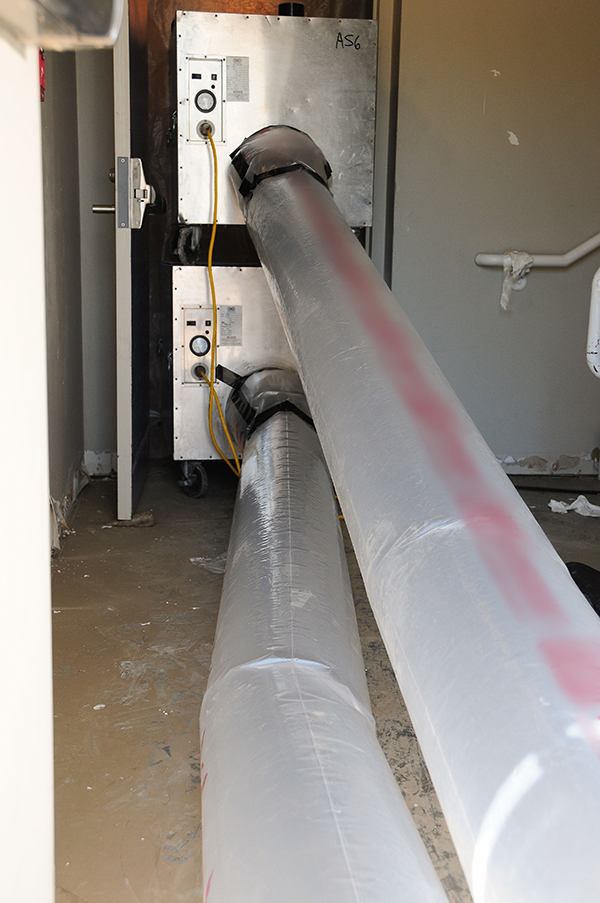During the winter, people are faced with severely cold temperatures and snowy weather conditions. The winter season, however, can also be harmful to your residential or commercial property if it is not prepared for the cold.
One of the threats the winter cold presents to homes and buildings is frozen pipes. When temperatures are freezing, it can turn the water inside the pipes into ice. When this change in state occurs, the ice expands in size, taking up more space than before. If the ice expands enough, it can place too much pressure on the pipe and force it to burst open, spewing water throughout the area. This is the case for all pipes regardless of whether they are made of metal or plastic.
When a pipe bursts, you will be left with not only a pipe that needs repair or replacement, but water damage, too. This becomes an emergency situation that requires immediate attention.
If a pipe freezes but does not burst, then it can become a leaking pipe. The pressure can create a leak where the pipe is cracked or has a joint. Additionally, ice may be acting as a dam, holding back a large amount of water from rushing out of the cracks.
Continue reading to learn more about frozen and burst pipes including how to prevent them, how to identify frozen pipes, and what to do about them.
Which Pipes are Prone to Becoming Frozen?
Certain pipes are more prone to becoming frozen during the winter, and this is due to their location.
Pipes along outside walls are more susceptible to freezing because of their close proximity to the cold temperatures. If there are areas of your property that are not well heated, then any pipes located there are prone to freezing as well. Some examples of such a spot are basements and crawlspaces. The pipes beneath sinks also do not get a lot of airflow, which makes it easier for these pipes to freeze.
Knowing this, keep an eye on the pipes in these and similar locations during the winter, and do what you can to prevent them from freezing and bursting.
How Can I Prevent a Burst Pipe?
To prevent pipes from bursting, you need to prevent them from becoming frozen. There are several ways this can be done.

Exposed pipes can be kept warm by being covered with pipe insulation. The insulation comes in various sizes and materials and can wrap around the pipe to keep it from freezing.
For pipes beneath sinks, open up the cabinet doors so that warm air can reach and circulate around the pipes. Make sure to also turn all faucets on to a slow drip. While minimal, this drip creates movement in the pipes, which lessens the chance of them becoming frozen.
How Do I Know If a Pipe is Frozen?
Not all water pipes are accessible or visible, so it can be tough to know whether you have frozen pipes. Frozen pipes often are covered with frost and may have bulges. Those bulges are where the ice has formed. Look for these features on the visible pipes when checking if they have frozen.
Other signs of frozen pipes include irregular faucet flow and toilets that do not refill with water after being flushed.
What Should I Do If A Pipe Bursts?
If a pipe bursts in your property, then you need to act quickly. Any situation regarding excess water in a building is an emergency that requires immediate attention because of the amount of damage the water may cause. Water damage that goes unaddressed can also easily lead to mold growth. Mold will cause its own damage, which is why immediate action is important.
Turn off the water supply to minimize the amount of water that floods your home or building. Then call a plumber to take care of the pipe. Mop up whatever water you can and seek professional help for the water damage.
Professional Water Damage Restoration Services for Burst or Leaking Pipes
Whether your frozen pipe has become a leaking pipe or a burst pipe, ServiceMaster NCR can help through the water damage restoration services we provide in the Washington, D.C. metro area. Our water recovery services are complete, so our IICRC-certified technicians will take care of the whole process from removing water to repairing damaged building materials.
The following are included within our water damage mitigation services:
- Removing standing water and excess moisture
- Drying and dehumidification for affected areas
- Restoring damaged building materials and personal contents
- Cleaning personal contents
- Cleaning and disinfecting affected areas
- Eliminating any mold and mildew
- Deodorizing the property
With help from ServiceMaster NCR, your home or business will be restored to the clean, safe environment it was prior to the pipe burst or leak.













